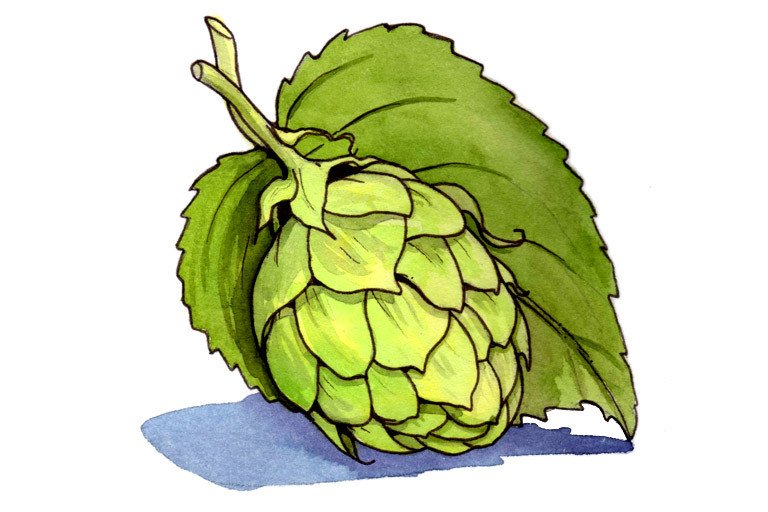
For Patients & Caregivers
Tell your healthcare providers about any dietary supplements you’re taking, such as herbs, vitamins, minerals, and natural or home remedies. This will help them manage your care and keep you safe.
What is it?
Data on hops extracts for conditions such as pain, insomnia, or menopausal symptoms are too limited to draw conclusions.
Hops are traditionally used in beer brewing as flavoring agents. Lab studies suggest that hops extracts may have antibacterial, anti-inflammatory, antidiabetic, and anticancer effects.
Studies in humans are quite limited, however. Preliminary data suggest it may help relieve pain, insomnia, or menopausal symptoms, but some of these studies use hops in combination with other herbs.
Additional studies are needed to confirm safety and efficacy. In addition, patients with hormone-sensitive cancers should consult their physicians before using products containing hops.
What are the potential uses and benefits?
- Arthritis
Preliminary data suggest hops extract in combination with rosemary leaf and oleanolic acid, may reduce pain in patients with osteoarthritis. More studies are needed. - Sleeping aid
Preliminary data suggest hops extract in combination with valerian may improve sleep in patients with mild insomnia. More studies are needed. - Menopausal symptoms
In postmenopausal women, a few studies suggest hops extracts may alleviate menopausal symptoms. - Diabetes
In a small study, hops extract lowered blood glucose and improved insulin sensitivity in patients with type-2 diabetes. Larger studies are required to confirm such effects.
What are the side effects?
- Several cases of respiratory disease have been associated with inhaling hop dust during harvest and processing.
What else do I need to know?
Do Not Take if:
- You have a hormone-sensitive cancer: Patients should consult their physicians before using products containing hops.
- You are taking CYP450 substrate drugs: Although lab studies suggest that hops extracts may inhibit several CYP enzymes, a standardized hops extract did not appear to cause clinically relevant interactions in humans. Still, patients should check with their doctor before taking hops.
- You are taking paracetamol (acetaminophen): In animal models, some hops species slowed clearance of paracetamol, thereby increasing its analgesic effects. Clinical relevance has yet to be determined.
For Healthcare Professionals
Scientific Name
Clinical Summary
Hops are the female inflorescences of the plant Humulus lupulus L. They are used primarily in beer brewing to add bitterness and flavor. Hops is also used as an herbal medicine for mood disturbance and insomnia (1) and to treat menopausal symptoms. In vitro studies suggest hops has antibacterial (28), chemopreventive (2) (3) (4), antitumor (5), antiangiogenic (6), anti-inflammatory (19), phytoestrogenic (29), and antidiabetic (7) properties. In murine models, hops reduced hyperlipidemia (8) and obesity (9), and protected against bone loss following estrogen depletion (21).
In clinical studies, a hops-valerian combination product was reported to improve sleep quality (10) (16) and insulin sensitivity in patients with type-2 diabetes (7). Other preliminary studies suggest hops extracts may alleviate mild depression, anxiety, and stress (23) or decrease body fat in healthy subjects (24). Data from an observational study suggest a combination of hops, rosemary extract, and oleanolic acid may help reduce arthritic pain (11). However, it is not clear whether hops alone would exert similar effects.
In postmenopausal women, a few studies suggest hops extracts may alleviate menopausal symptoms (13) (17) (25) and improve bone health (18). Some studies also indicate that derivates of hops have phytoestrogenic effects (7) (12). Patients with hormone-sensitive cancers should consult their physicians before using products containing hops.
Food Sources
Female inflorescences of Humulus lupulus L.
Purported Uses and Benefits
- Arthritis
- Insomnia
- Menopausal symptoms
- Diabetes
Mechanism of Action
Animal models suggest isomerized hops extracts may increase plasma HDL levels and decrease atherosclerosis index via PPAR-alpha activation (14). These extracts also reduced plasma triglycerides and induced hepatomegaly (8). A product containing hops extract reduced C-reactive protein in patients with inflammatory diseases (12).
Prenyl flavonoids from hops, xanthohumol, isoxanthohumol, and 8-prenylnaringen (8-PN) inhibit aromatase activity and breast cancer cell proliferation, increase apoptosis (5), and inhibit prostate cancer cell proliferation (3). 8-PN is among the potent estrogen receptor alpha phytoestrogens, which is likely responsible for relief of menopausal symptoms (29). In addition, xanthohumol exhibits antiangiogenic effects by inhibiting the NF-kB and Akt pathways (6). Isoadhumulone, isocohumulone, and isohumulone derived from hops selectively inhibited aldo-keto-reductase 1B10, which is upregulated in various cancers promoting carcinogenesis (30).
Isoxanthohumols are converted in the distal human gut into 8-PN via intestinal microflora activity (12). This process also occurs in the liver and is regulated by CYP450 enzymes (15).
Adverse Reactions
- Several cases of respiratory disease have been associated with inhaling hop dust during harvest and processing (26).
Herb-Drug Interactions
- Cytochrome P450 substrates: Although in vitro studies suggest hops may inhibit 1A2, 2C8, 2C9, and 2C19 (27), a standardized hops extract did not appear to cause clinically relevant interactions with 1A2, 2C9, 2D6, 3A4, or 3A5 in humans (31).
- Paracetamol (acetaminophen): In murine models, some hops species slowed clearance of paracetamol, thereby increasing its analgesic effects. Clinical relevance has yet to be determined (20).